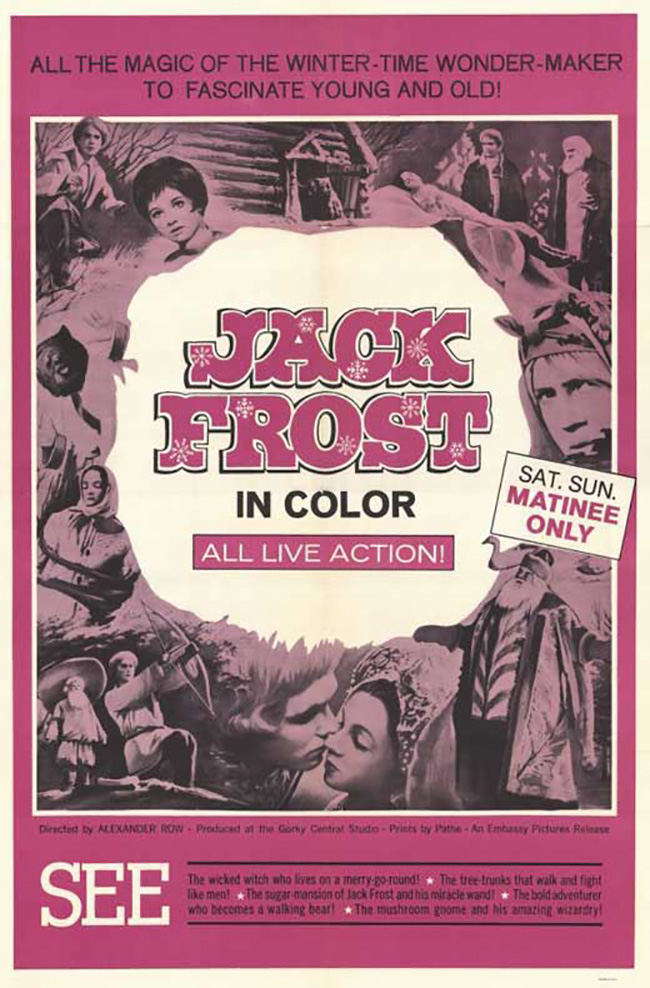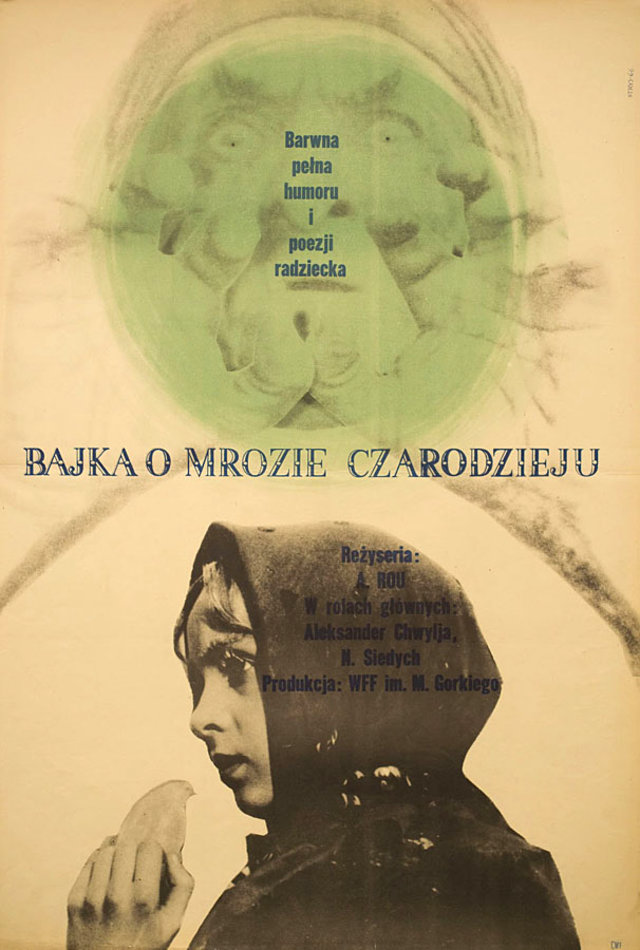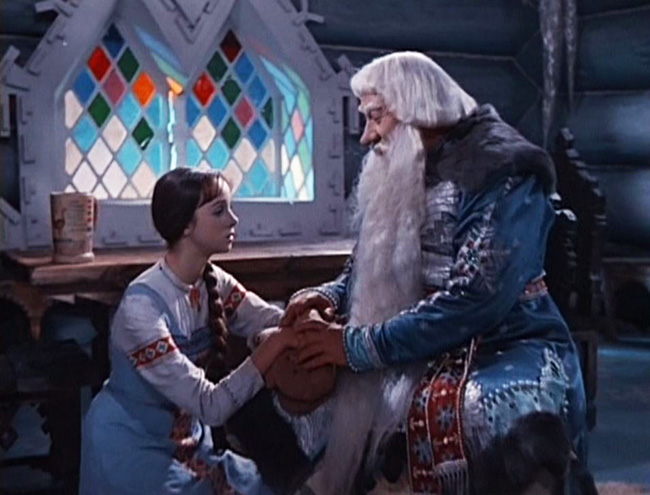
To mark the upcoming premiere of the new season of Mystery Science Theater 3000 on Netflix, I’ve been covering each of the Russian films featured on the classic run of the series, including The Day the Earth Froze (Sampo, 1959), The Magic Voyage of Sinbad (Sadko, 1952), and The Sword and the Dragon (Ilya Muromets, 1956). To wrap up, let’s take a look at the original film which became English-dubbed and mercilessly mocked as Jack Frost, an episode in the eighth season of MST3K, its fledgling year on the Sci-Fi Channel. The true title is Morózko, or Father Frost, and it was released in 1964 and subsequently made the international film festival rounds, picking up a few prizes before debuting in the U.S. as a kid-friendly matinee in 1966 (“Jack Frost: All the magic of the winter-time wonder-maker to fascinate young and old!”). Perhaps befitting the split between the Comedy Central days of MST3K and its run on the Sci-Fi Channel, there is a marked difference between this Russian film and the three that came before: namely that it is not directed by Aleksandr Ptushko. Father Frost is by Aleksandr Rou, who, although dealing in the same genre of fairy tales, folklore, and historical legends, had a different style and approach than Ptushko. Aleksandr Rou (or “Alexander Rowe,” 1906-1973) didn’t have Russian blood; he was born to a Greek mother and an Irish father, who was invited to Russia to help organize the flour-grinding industry. Rou attended Russian film school before embarking on a film career, first as an assistant director, then director behind films such as Wish Upon a Pike (1938) and the wonderful Vassilisa the Beautiful (1939). His specialty was the fairy tale film, a genre all its own in Russia. Whereas Ptushko was an animator who, in his live action films, was fascinated with Méliès-like visual trickery and invention, Rou’s films rely upon detailed costumes and set designs to conjure the world of Russian fairy tales. Often Rou pushes his style into the realm of broad pantomime; for the most part, his movies feel more like children’s movies than Ptushko’s (for a prime example, see Rou’s goofy 1969 fantasy Barbara the Fair with the Silken Hair). If anything, this makes Father Frost even better fodder for MST3K than the Ptushko films; with Rou’s manic, sugar-high editing and extreme close-ups, and the actors playing strictly to the cheap seats, anyone over the age of five is likely to feel dazed and winded after the first half hour – but even then, it’s only picking up steam before unloading the real wackiness (just wait until Baba Yaga shows up).
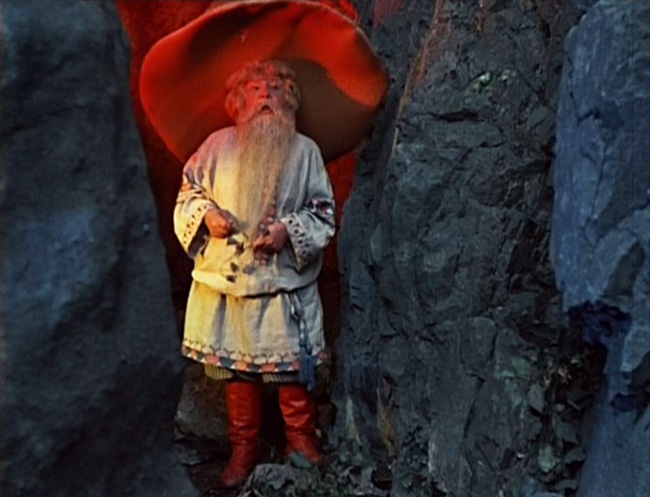
Galina Borisova as Father Mushroom.
Keep in mind that Rou’s films were very popular in Soviet Russia, ideal children’s entertainment. It’s actually not that hard to see why: they’re elaborately staged with great attention to detail, and Father Frost is no exception. He creates an entire world for you to inhabit (although older viewers may want some sort of chemical stimulation to complete the experience). Location shooting took place on the Kola Peninsula, located at the most northwestern points of Russia, north of the 66th parallel and adjacent Finland and Norway. It was an appropriate location, not just to capture the winter wonderland look of the film, but because much of Russian folklore originates in the western regions next to Scandinavia. Father Frost/Jack Frost is the Russian Father Christmas/Santa Claus, though this particular fairy tale shares familiar elements with Cinderella. (It’s an amalgam of different tales, but the main story can be found in the anthology Russian Fairy Tales by Aleksandr Afanas’ev under the title “Jack Frost.”) A stepdaughter, Nastenka (young ballerina Natalya Sedykh), finds no love from her stepmother (Vera Altayskaya), and only abuse from the woman’s true daughter, the spoiled and ugly Marfúshka (Inna Churikova). She spends most of her time alone, speaking to “rosy dawn” and the roosters. Meanwhile, the vain Ivan (Eduard Izotov), who can’t stop looking at himself in a hand mirror, falls in love with Nastenka, but she rejects him for his arrogance. He then invokes the wrath of the magical gnome Father Mushroom, or Starichok-Borovichok (Galina Borisova), for ingratitude toward his gifts, and he transforms into a bear. He’s only changed back when he demonstrates nobility, and he goes looking for Nastenka. But by now Nastenka has been exiled to the snowy wilderness by her hateful stepmother. She’s rescued by Father Frost, who takes her to his cottage. He departs, and she accidentally touches his magic scepter that he leaves behind, the staff that delivers winter’s frost. She falls into an eternal sleep. Ivan travels into the snowy lands to find her, and seeks help from Baba Yaga (Georgy Millyar, in drag), the witch who lives in a hut that walks around on chicken legs.
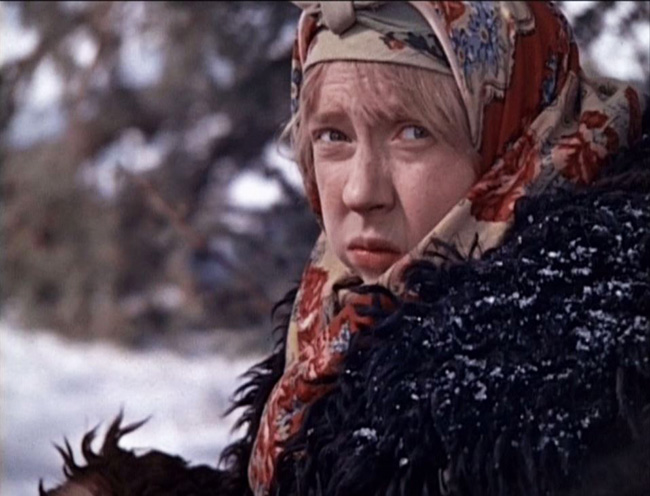
Inna Churikova as Marfúshka
Although obviously saddled with the usual awful dubbing, the Jack Frost of MST3K and the original Morózko (released on DVD by Ruscico) are not all that different. The main element missing from the 1966 imported version is cultural texturing. In the original Russian, the film features a few Russian songs (including a surprisingly haunting little tune which Nastenka sings) and has a rich score including balalaika music. But – let’s face it – Father Frost is no unheralded masterpiece, and cannot compare with the increasingly painterly Russian films of Ptushko. What it does offer is a beautifully designed fairy tale world, including Baba Yaga’s impressive-looking chicken-leg hut (which is compelled to turn around as Ivan commands it), its evocative interior lit red by a hot furnace and decorated with cobwebs and black cats, and Father Frost’s icicle-draped home of stained glass windows and solid-ice flooring. The film might be enchanting to a young Russian child in the mid-60’s, but now it’s hard to ignore all the eccentric or downright bizarre choices, such as casting the childlike Sedykh as Nastenka opposite Izotov as Ivan, who looks like he’s in his 30’s – and wears blue eyeshadow. Or the pig-shaped magical sled that snorts at the black cat that goes running by. Or Father Frost’s running around a fir tree like something out of Benny Hill. Or the nonstop “comic” slapstick of Baba Yaga. All I can say is that it’s the least of the four Russian films picked for MST3K, yet it’s easily my favorite episode because there is just so much that begs for commentary. No insult meant to Rou. He merely intended a movie like a storybook read aloud to children, which is why he bookends his film with an old woman addressing the audience directly (a framing device like this is a trope of Russian fairy tale films). The intention is to suspend your disbelief and enter a more innocent frame of mind. With Father Frost, that’s quite the task.
